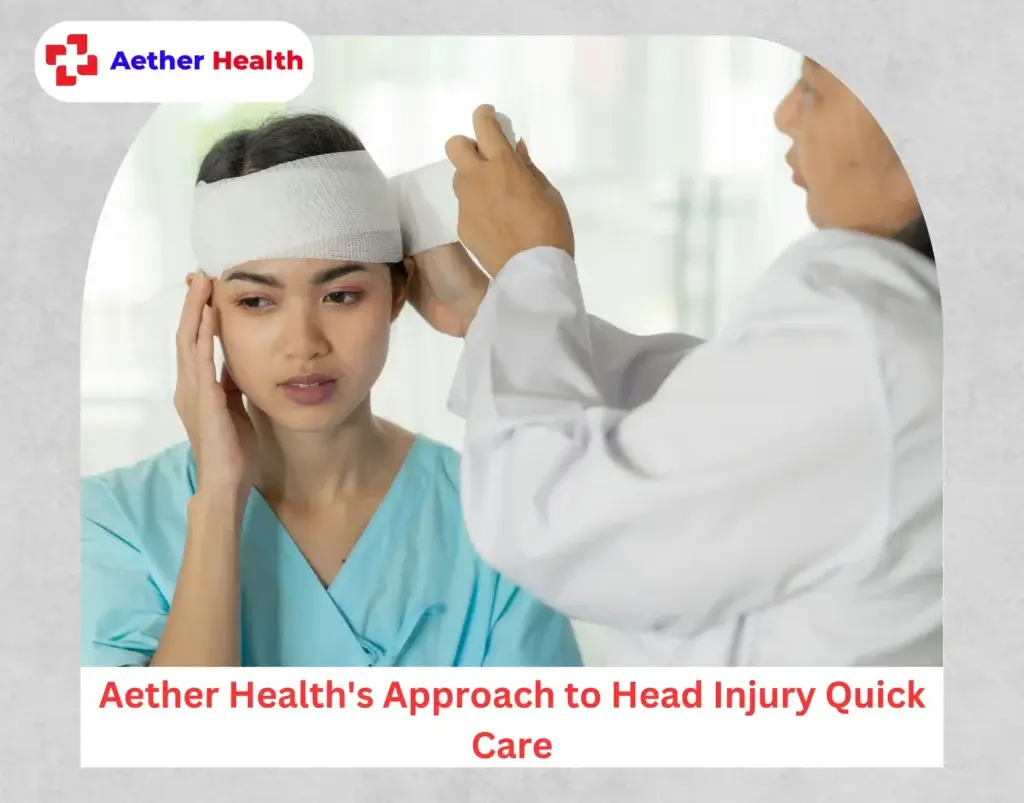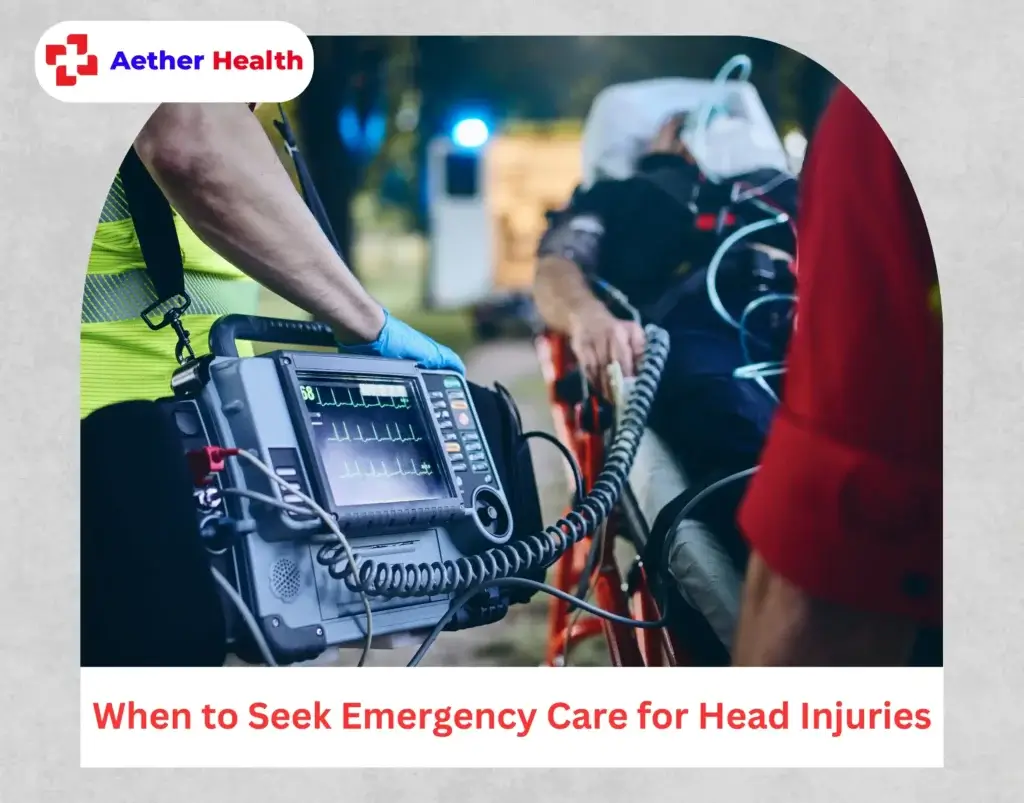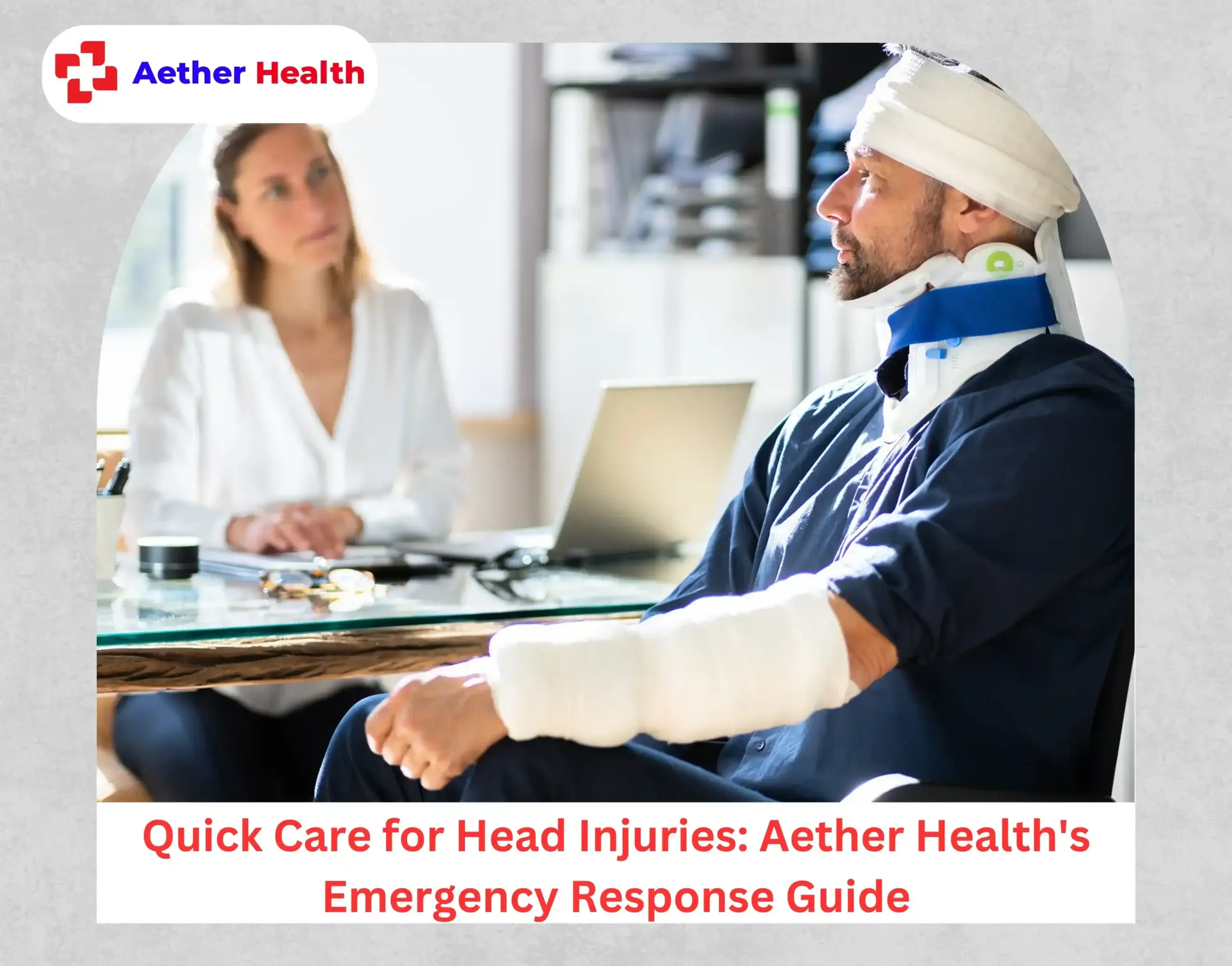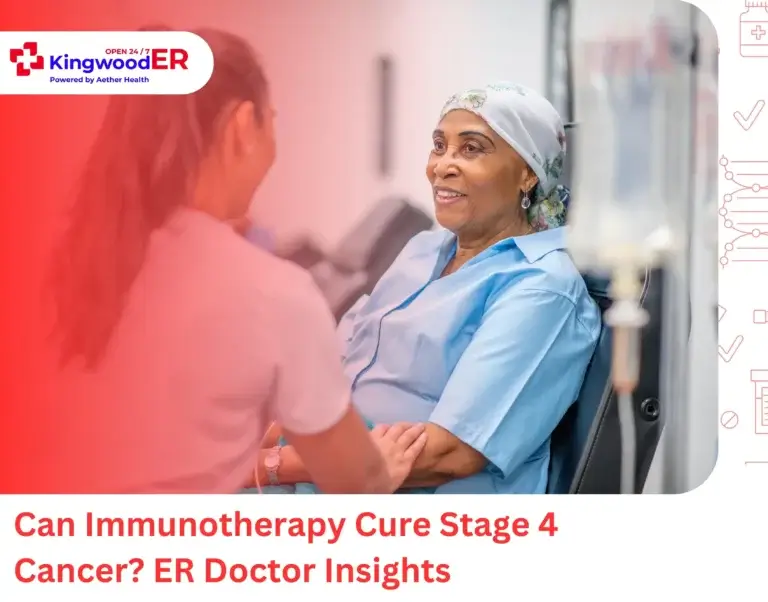A blow to the head changes everything in seconds. That moment of impact, whether from an unexpected fall, a car accident, or a weekend soccer match, demands immediate decisions. With 2.8 million Americans suffering traumatic brain injuries annually, knowing when to seek head injury quick care is critical.
At Aether Health Emergency Rooms, our team delivers emergency care for head injuries using advanced diagnostics and proven treatment protocols. Our board-certified physicians provide immediate evaluation for head injuries that forms the foundation for effective healing.
Head Injury Quick Care: Why Rapid Response Saves Lives

Head injuries range from mild concussions to severe traumatic brain injuries (TBIs). The brain’s complex structure means even seemingly minor damage can affect cognition, movement, sensation, and personality. The greatest danger? Many serious head injuries show minimal external signs while internal damage progresses silently.
Doctors call the first 60 minutes after head injury the “golden hour”. It’s a critical window where rapid intervention can dramatically improve your outcomes. During this crucial period, emergency physicians try to control bleeding, manage swelling, and stabilize your vital signs to prevent permanent damage.
Quick care matters with head trauma. Even when the patient initially feels fine, it’s crucial to seek rapid diagnosis and immediate assessment.
Common Causes of Head Injuries
Head injuries can happen in numerous situations and environments. Let’s understand the common causes and you can prevent them or formulate an appropriate response:
I. Falls
Falls rank as the leading cause of head injuries across all age groups. Elderly adults and young children face the highest risk, with falls happening at home, in public spaces, or care facilities. Even a seemingly minor fall can cause serious internal damage requiring quick medical assessment.
II. Vehicle Collisions
Car, motorcycle, and bicycle accidents frequently result in traumatic brain injuries. The sudden stopping forces throw the brain against the skull’s interior, causing bruising, bleeding, or tissue damage.
III. Sports Accidents
Contact sports like football and soccer present obvious risks, but even non-contact activities like basketball can lead to head injuries through falls, collisions with other players, or impact with equipment. Proper protective gear and concussion protocols help minimize these risks.
IV. Physical Assaults
Being struck during an altercation can cause serious trauma, particularly when unexpected. Any blow to the head during an assault demands quick medical evaluation regardless of initial symptoms.
V. Workplace Accidents
Construction sites and industrial environments present unique hazards including falling objects, machinery accidents, and falls from height. These high-impact incidents often require emergency head injury quick care protocols.
Recognizing the Symptoms of Head Injury
Recognizing the symptoms of a head injury quickly can be lifesaving. The signs vary widely based on injury severity, and some critical symptoms may develop hours after the initial trauma. Be vigilant for the following warning signs:
Mild to Moderate Symptoms
- Persistent or worsening headaches that don’t respond to pain relievers
- Confusion or disorientation about time, place, or recent events
- Dizziness or problems with balance when standing or walking
- Nausea or vomiting, especially if occurs more than one
- Mood changes, irritability, or emotional outbursts
- Memory problems or difficulty concentrating
- Unusual fatigue or drowsiness
- Sensitivity to light or noise
Severe Warning Signs
- Loss of consciousness, even if only for seconds
- Seizures or convulsions following head trauma
- Weakness or numbness in arms or legs
- Unequal pupil size or unusual eye movements
- Clear fluid leaking from the nose or ears
- Slurred speech or difficulty forming words
- Severe confusion or agitation
Even mild symptoms deserve professional evaluation. With head injury quick care, many complications can be prevented before they become life-threatening emergencies.
Aether Health’s Approach to Head Injury Quick Care

At Aether Health, our emergency care for head injuries prioritizes rapid assessment and immediate treatment to minimize the risk for long-term complications.
Rapid Assessment and Intervention
The first minutes after arrival are crucial. Our board-certified emergency physicians conduct quick neurological evaluations to determine injury severity and begin appropriate interventions. This includes:
- Thorough neurological examinations
- Vital signs monitoring
- Detailed assessment of injury circumstances
- Pain management and initial stabilization
Our team works quickly to identify life-threatening conditions requiring immediate attention while providing compassionate care during a frightening time.
Advanced Diagnostic Technology
Our facilities provide on-site radiology services specifically for head injury assessment:
- CT scanning to identify bleeding, swelling, or skull fractures
- Digital X-rays for detecting skull and cervical spine injuries
- Advanced monitoring systems to track vital neurological functions
- Comprehensive laboratory testing services
These diagnostic tools allow our physicians to make accurate, timely decisions about your care needs during the critical first hours after injury.
Expert Emergency Teams
Our emergency physicians and nurses have extensive experience diagnosing and treating head trauma. For patients requiring specialized care beyond our scope, we coordinate seamless transfers to appropriate neurology specialists or trauma centers, while providing crucial stabilizing care before transport.
Patient and Family Education
We believe that knowledge empowers recovery, which is why we place significant emphasis on educating patients and their families about head injuries. Our teams provide clear explanations of:
- Your specific head injury diagnosis and its implications
- Warning signs that require immediate follow-up
- Home care instructions for recovery
- When and where to seek follow-up care
- Concussion recovery protocols when applicable
By keeping patients and families informed, we help them navigate the recovery journey with confidence and awareness.
Observation and Follow-up Planning
For moderate head injuries requiring monitoring but not hospitalization, we provide observation services to ensure symptoms don’t worsen before discharge. Our physicians:
- Monitor neurological status at regular intervals
- Assess medication effectiveness
- Provide detailed discharge instructions
- Recommend appropriate follow-up care
When you need head injury quick care, Aether Health delivers the immediate emergency response that forms the foundation for successful recovery.
When to Seek Emergency Care for Head Injuries

Aether Health provides clear guidance on when head injury quick care becomes essential. Don’t hesitate to visit our emergency room if you observe:
- Any loss of consciousness, even briefly
- Persistent or worsening headache
- Repeated vomiting or ongoing nausea after head trauma
- Seizures or convulsions following injury
- Difficulty waking or excessive drowsiness
- Confusion, disorientation, or memory problems
- Unsteady walking, dizziness, or poor coordination
- Weakness or numbness in any part of the body
- Clear fluid draining from ears or nose
- Unequal pupil size or unusual eye movements
- Slurred speech or difficulty speaking
Special Warning Signs of Head Trauma in Children
Children present unique challenges when evaluating head injuries. Their developing brains can respond differently to trauma, and young children often cannot articulate their symptoms clearly. Watch for these additional warning signs:
- Refusal to eat or nurse
- Persistent crying and inability to be consoled
- Changes in play behavior or sudden loss of interest in favorite activities
- Unusual irritability or heightened sensitivity to light and sound
- Changes in sleep patterns, either sleeping too much or difficulty sleeping
- Balance problems or unsteady walking, especially in toddlers who normally walk well
- Seizures or unusual body movements
- Loss of newly acquired skills (for infants and toddlers)
- Vomiting without other illness symptoms
Trust your instincts. If your child “doesn’t seem right” after a head impact, seeking professional evaluation at Aether Health’s emergency rooms is the safest decision. Our physicians can assess pediatric head injuries and provide age-appropriate emergency care.
Seek Head Injury Quick Care in Texas
When facing a head injury, quick action makes all the difference. At Aether Health Emergency Rooms, our board-certified physicians provide immediate assessment, advanced diagnostic imaging, and evidence-based treatment for all types of head trauma.
Don’t wait or wonder if your symptoms warrant attention. Visit Aether Health for head injury quick care whenever you experience concerning symptoms. Our team is available 24/7 with minimal wait times. No appointments needed!
[Get Emergency Care for Head Injury]
FAQs
1. What to do immediately after a head injury?
For mild injuries with no concerning symptoms, apply ice to reduce swelling and take pain relievers after consultation. For moderate to severe injuries (loss of consciousness, confusion, vomiting, seizures), go to the emergency room immediately. Don’t move someone with a potential neck injury unless absolutely necessary.
2. How to test for brain damage at home?
You cannot reliably test for brain damage at home. Watch for signs like confusion, dizziness, trouble remembering things, slurred speech, or vision problems. If you notice these, seek immediate medical care rather than attempting self-diagnosis.
3. Why do I still have symptoms when all my scans are normal?
Normal imaging results don’t rule out concussion or mild traumatic brain injury. CT scans and MRIs can’t detect microscopic cellular changes that cause symptoms. Recovery often follows an unpredictable pattern with symptoms that improve, then temporarily worsen. This fluctuation is frustrating but typically part of normal healing.
4. Are these muscle knots around my head and neck related to brain damage?
Physical discomfort like muscle spasms, jaw tension, and tender spots are common after head injuries but rarely indicate brain damage. They typically result from impact forces affecting muscles and soft tissues. These symptoms often resolve with proper rest, gentle stretching, and occasionally physical therapy.
5. My child hit their head at daycare. How do I know if they need emergency care?
When injury circumstances are unclear, watch for changes in behavior, unusual drowsiness, vomiting, severe headache, or difficulty walking. Young children may show irritability, crying inconsolably, or refusing to eat. Trust your instincts. If your child “doesn’t seem right,” Aether Health provides quick evaluations for peace of mind.
6. Can you sleep after hitting your head?
You can sleep after a minor head injury, but someone should check on you periodically during the first 24 hours. If you experienced loss of consciousness, confusion, vomiting, or other concerning symptoms, seek medical evaluation before sleeping.
7. What do eyes look like with a concussion?
Concussion may cause pupil changes (unequal size or abnormal reaction to light), unusual eye movements, or vision problems like double vision or light sensitivity. These symptoms require immediate medical attention at your nearest emergency facility.
8. What is the finger test for concussion?
This test involves tracking a moving finger with your eyes. If the person struggles to follow the finger smoothly or experiences jerky, uneven movements, it may indicate a concussion. Poor performance may signal coordination problems after head trauma, but only medical professionals can properly interpret results.
9. What tests are done after hitting your head?
Depending on symptoms, tests may include neurological exams, CT scans or occasionally MRIs. Doctors assess vital signs, pupil responses, balance, coordination, memory, and cognitive function. At Aether Health, our emergency physicians determine which diagnostic tests are appropriate based on your specific injury.
10. What blood test for head injury?
No single blood test definitively diagnoses all head injuries. However, doctors sometimes measure proteins like S100B or neuron-specific enolase that may indicate brain tissue damage. These tests are usually combined with other evaluations, such as imaging scans and neurological exams, to get a complete understanding of the injury.




